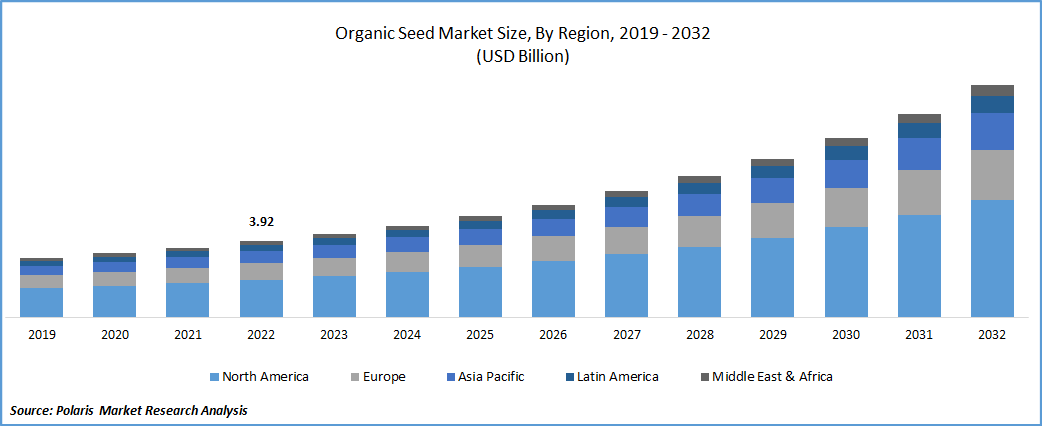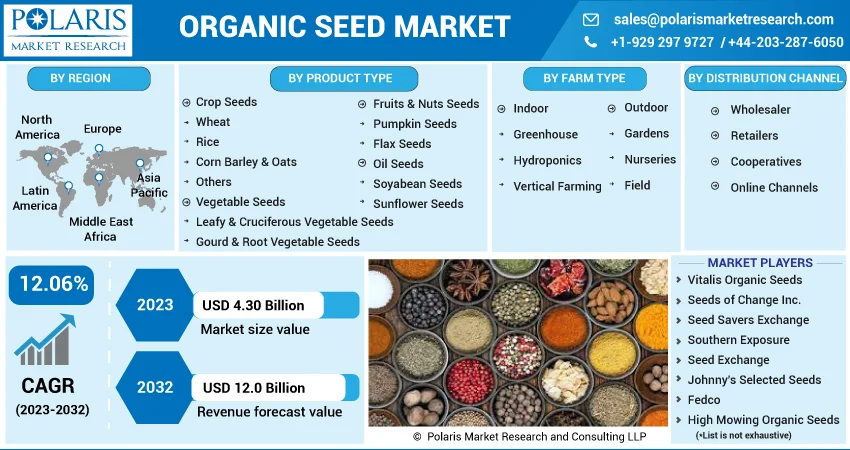
Organic Seed Market Share, Size, Trends, Industry Analysis Report
By Product Type (Crop Seeds, Vegetable Seeds, Fruits & Nuts Seeds, Oil Seeds, Others), By Farm Type, By Distribution Channel, By Region, Segments & Forecast, 2023 – 2032
- Published Date:Mar-2023
- Pages: 115
- Format: PDF
- Report ID: PM1101
- Base Year: 2022
- Historical Data: 2019-2021
Report Outlook
The global organic seed market was valued at USD 3.92 Billion in 2022 and is expected to grow at a CAGR of 12.06% in the forecast period. The growing consumer preferences towards organic and natural products and significantly increasing demand for these products are expected to be the major driving factor of the organic seeds industry. In addition, the increasing interest in sustainable agriculture, improved seed quality and diversity, and rising awareness about the benefits of organic seeds are other supporting factors for the market.

Know more about this report: Request for sample pages
Organic seeds are seeds that are produced using organic farming methods without the use of synthetic pesticides, herbicides, and fertilizers. These seeds are typically open-pollinated, which means they are pollinated by natural means, such as wind, insects, or birds, rather than through controlled breeding techniques. In addition to being produced using organic farming practices, organic seeds are also free of genetic modification. It means the seed's genetic makeup has not been altered in a laboratory setting to enhance certain traits, such as resistance to pests or herbicide tolerance.
It offers several benefits over conventionally produced seeds, including being free of synthetic pesticides and fertilizers, greater genetic diversity, better soil health, resilience to pests and diseases, and better taste and nutrition. They are produced without the use of synthetic pesticides, herbicides, and fertilizers, which can have harmful effects on human health and the environment. Moreover, this farming practice promotes soil health by using natural fertilizers and other soil-building techniques. For instance, India's export of organic products has grown by 39% to 888,179 metric tons (MT) during FY 2020 – 21 compared to 638,998 MT shipped in 2019-20.
The COVID-19 pandemic has significantly impacted many industries, including the organic seed market. The effects of the pandemic on the market have been both positive and negative. One of the positive effects of the pandemic is the increase in demand for organic food products. Many consumers have become more health-conscious and seek organic products that are perceived to be healthier and safer. It has led to an increased demand for organic seeds, which has resulted in increased sales for organic seed companies.
However, the pandemic has also had negative effects on the organic seed market. The pandemic has led to disruptions in the global supply chain, which has resulted in delays in the shipment of organic seeds. It has made it difficult for organic seed companies to maintain their inventory levels and meet the growing demand for organic seeds.
However, certain factors are responsible for limiting the growth of base oils in the forecast period. Factors include limited availability, higher cost, research and development, infrastructure, regulation, and the need for more awareness. Organic seeds still need to be widely available as compared to conventional seeds. It limits the adoption of organic farming practices among farmers. In addition, these seeds are generally more expensive than traditional seeds. It can make it difficult for small-scale farmers to afford them, thus limiting the market. Moreover, many farmers need to be made aware of the benefits of organic farming and may not see the need to purchase organic seeds.

Know more about this report: Request for sample pages
Industry Dynamics
Growth Drivers
The negative impact of chemical fertilizers has been one of the driving factors behind the growth of the market. Consumers are becoming more aware of the harmful effects of chemical fertilizers on the environment and human health. As a result, they are looking for alternative products that are healthier and more sustainable. Chemical fertilizers have been linked to various environmental and health problems, leading to an increased demand for organic products, including organic seeds. On the other hand, organic seeds are grown without chemical fertilizers, pesticides, or herbicides. It ensures that the entire food chain, from the soil to the consumer, is not exposed to harmful chemicals, promoting healthier food and a healthier environment.
The growing interest in sustainable agriculture practices, including organic seeds, is the second key driving factor in the market. Organic seeds are produced without synthetic pesticides, herbicides, and fertilizers, making them popular for sustainable farming practices. As more farmers adopt sustainable farming practices and consumers demand organic products, the demand for organic seeds will continue growing, leading to a more sustainable and environmentally friendly food system.
Report Segmentation
The market is primarily segmented based on product type, farm type, distribution channel, and region
|
By Product Type |
By Farm Type |
By Distribution Channel |
By Region |
|
|
|
|
Know more about this report: Request for sample pages
The vegetable seeds segment is anticipated to dominate the market in the forecast period.
The vegetable seeds segment will dominate the market from 2023 to 2032. The vegetable seeds segment is one of the largest and most established segments in the market. Organic vegetable seeds are in high demand due to the growing consumer preference for healthy, sustainable, and locally produced food. The segment includes various organic vegetable seeds, including tomatoes, peppers, cucumbers, carrots, and lettuce. The segment is driven by increasing consumer demand for organic vegetables, preference for locally produced food, innovation, and favorable government policies.
The crop seeds segment is expected to witness a significant growth rate in the market, driven by increasing consumer demand for organic food, favorable government policies, growing demand for organic cotton, and innovation in seed technology.
The Wholesale distribution segment is anticipated to dominate the market in the forecast period.
The wholesale distribution segment is an important part of the organic seed market. Wholesale distributors are critical in connecting seed producers with farmers and other end-users. They typically buy organic seeds in bulk from seed producers and sell them to retailers, seed dealers, farmers, and other customers. Several factors driving the growth of the wholesale distribution segment include increasing demand for organic seeds, growing interest in locally produced food, technological advancements, and government policies and regulations.
The cooperatives distribution channel segment is projected to grow significantly in the forecast period. The segment will likely be driven by increasing demand for organic seeds, access to resources and expertise, supportive policies and regulations, and social and environmental benefits.
North America region is leading the market in terms of revenue share for the year 2022
North America is a major producer and consumer of organic food and agricultural products, and organic seeds are an important market component. The region includes the United States, Canada, and Mexico. For instance, as per Organic Trade Association, the U.S. imported worth of $25 billion of organic crops in 2020, which was 4% higher than in 2016, while the U.S. exports reached $647 million in 2020, a 17% higher value than in 2016.
In addition to these driving factors, the North American organic seed market is also characterized by a high degree of market consolidation, with a small number of large seed companies dominating the market. It has led to concerns about the concentration of power and the potential for reduced competition and innovation.
Competitive Insight
Some of the prominent key players operating in the Marketspace includes Vitalis Organic Seeds, Seeds of Change Inc., Seed Savers Exchange, Southern Exposure Seed Exchange, Johnny's Selected Seeds, Fedco, High Mowing Organic Seeds, Navdanya, Rijk Zwaan, Bayer Group
Recent Developments
- September 2021: Bayer Group has announced its expansion plan to launch organic vegetable seeds under Vegetables by Bayer umbrella and Seminis and De Ruiter vegetable seed brands, to fulfil the increased customer need for high quality organic seeds.
- March 2020: Graines Voltz, a French vegetable and floral seeds distributor, has acquired HILD Samen, a German seed company, from BASF to expand its product portfolio and geographic reach.
Organic Seed Market Report Scope
|
Report Attributes |
Details |
|
Market size value in 2023 |
USD 4.30 Billion |
|
Revenue forecast in 2032 |
USD 12.00 Billion |
|
CAGR |
12.06% from 2023 - 2032 |
|
Base year |
2022 |
|
Historical data |
2018 - 2021 |
|
Forecast period |
2023 - 2032 |
|
Quantitative units |
Revenue in USD Billion and CAGR from 2023 to 2032 |
|
Segments covered |
By Product Type, By Farm Type, By Distribution Channel, By Region |
|
Regional scope |
North America, Europe, Asia Pacific, Latin America, Middle East & Africa |
|
Key companies |
Vitalis Organic Seeds, Seeds of Change Inc., Seed Savers Exchange, Southern Exposure Seed Exchange, Johnny's Selected Seeds, Fedco, High Mowing Organic Seeds, Navdanya, Rijk Zwaan, Bayer Group. |
FAQ's
Key companies in organic seed market are Vitalis Organic Seeds, Seeds of Change Inc., Seed Savers Exchange, Southern Exposure Seed Exchange, Johnny's Selected Seeds, Fedco, High Mowing Organic Seeds, Navdanya.
The global organic seed market expected to grow at a CAGR of 12.06% in the forecast period.
The organic seed market report covering key segments are product type, farm type, distribution channel, and region.
Key driving factors in organic seed market are increasing demand for organic products and Negative impact of chemical fertilisers on the entire food chain.
The global organic seed market size is expected to reach USD 12.00 Billion by 2032.
